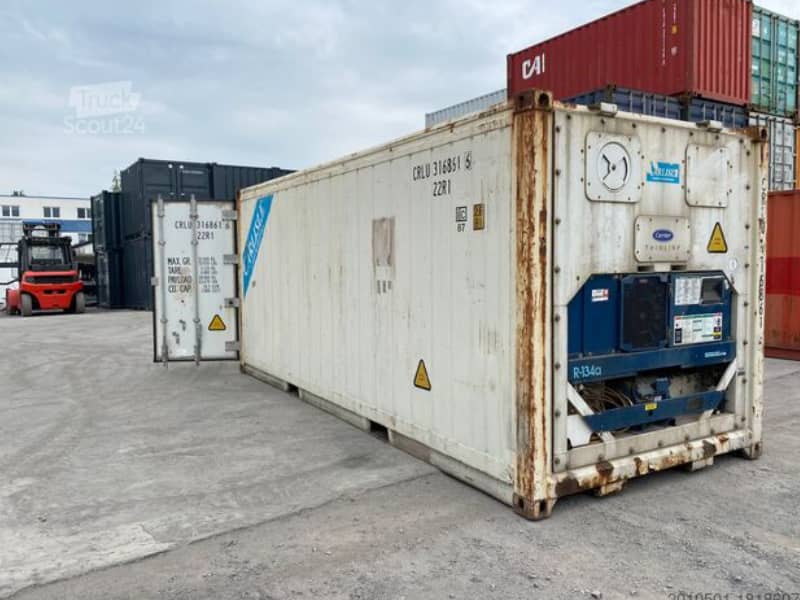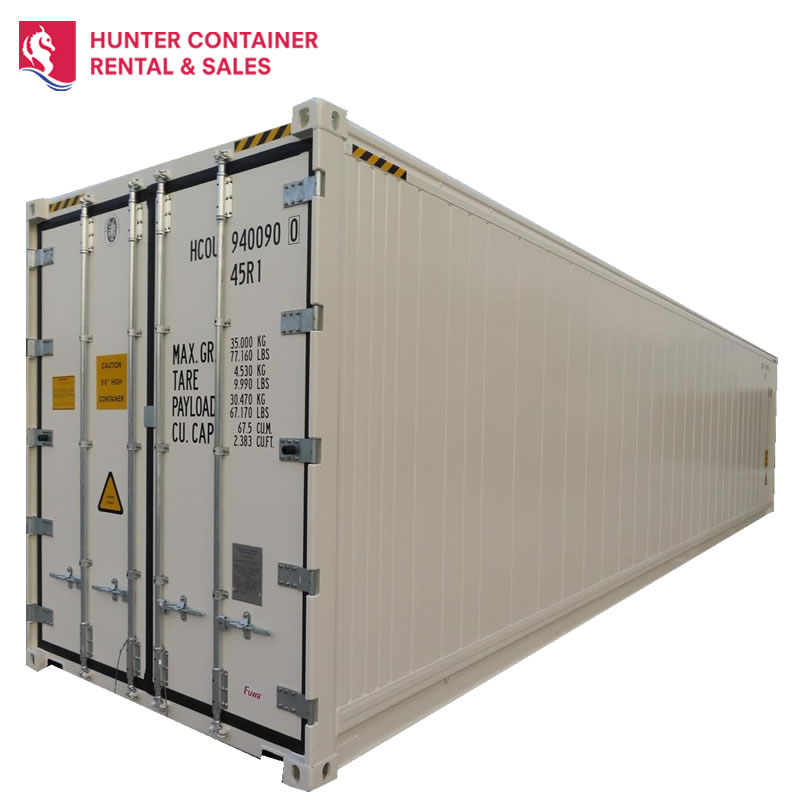Choose trusted used 40ft refrigerated shipping containers for storage growth
All About Cold Storage Containers: Vital Insights for Your Storage Space Demands
Cold storage containers play a crucial function in the conservation of disposable items. They are available in numerous types, including cooled and protected units, each made for certain storage needs. Understanding the advantages and essential attributes of these containers is essential for organizations aiming to enhance their procedures. As the demand for effective storage space solutions expands, checking out the different choices offered can cause educated decisions that impact both earnings and sustainability. What variables should one think about when selecting the right container?
Kinds of Cold Store Containers
Cold storage space containers can be found in numerous kinds, each designed to meet details temperature level control demands. Among one of the most usual types are chilled containers, which preserve temperature levels between 0 ° C to 10 ° C, making them suitable for subject to spoiling goods like fruits, vegetables, and milk products. Another type is the deep freezer container, which operates at temperatures listed below -18 ° C, suitable for long-term storage space of icy items such as meats and fish and shellfish.
Shielded containers supply temperature stability without energetic air conditioning, making them beneficial for short-term transport of temperature-sensitive items. In addition, there are mobile freezer devices, which offer flexibility in areas and are often made use of in events or seasonal operations. Finally, blast refrigerators swiftly lower the temperature of warm foods, making certain safety and security and high quality. Each type offers an one-of-a-kind function in different markets, from food service to pharmaceuticals, stressing the relevance of selecting the right container for details storage space demands.

Benefits of Utilizing Cold Storage Solutions

Chilly storage remedies prolong the rack life of items, decreasing waste and increasing profitability for services. By efficiently taking care of stock with proper temperature level control, business can maximize their supply chains and enhance operational effectiveness.
Additionally, freezer centers allow for adaptable storage alternatives, accommodating different volume demands and seasonal changes sought after (used 40ft refrigerated shipping containers). This adaptability assists services respond rapidly to market adjustments
Utilizing cold storage options can ensure compliance with health and wellness and safety and security laws, protecting both customers and companies. On the whole, the strategic use of freezer enhances product administration while advertising sustainability and financial viability.
Key Functions to Try To Find in Freezer Containers
When picking cold store containers, a number of essential functions merit careful consideration to protect peak performance and reliability. Initially, temperature level control capacities are crucial; containers need to keep consistent temperatures suitable for specific goods. Insulation top quality additionally plays a significant role, as superior insulation reduces power usage and boosts temperature stability.
Next off, ease of gain access to and loading is vital; containers ought to provide user-friendly layouts for effective handling and company. Resilience is an additional essential element; weather-resistant products assure longevity and safeguard components against ecological aspects.
Furthermore, mobility features, such as integrated wheels or lifting points, help with transport, while personalized designs allow for customized storage remedies.
Last but not least, checking systems, including temperature level alarm systems and remote monitoring, offer real-time updates, ensuring that problems remain excellent. By concentrating on these functions, users can choose cool storage containers that fulfill their operational needs effectively.
Choosing the Right Freezer Container for Your Needs
Selecting the appropriate cold storage space container requires a thoughtful evaluation of functional requirements and particular demands. Factors such as the kind of products being kept, temperature level sensitivity, and volume must be prioritized. Perishable food items may require containers with rigorous temperature level controls, while pharmaceuticals may need specific conditions to preserve effectiveness.
Furthermore, prospective individuals need to consider the container's size and mobility. A larger system may be required for bulk storage, while smaller, portable alternatives could be ideal for momentary or on-site demands. Insulation high quality and energy performance are also critical, as these will influence operational prices and temperature level stability.
Conformity with sector policies and standards is essential, specifically in fields like food and health care. By very carefully evaluating these facets, customers can choose a chilly storage container that successfully satisfies their distinct requirements and guarantees optimum storage space problems.
Best Practices for Keeping Freezer Conditions
Preserving ideal cold store conditions is vital for maintaining the top quality and security of temperature-sensitive items. Routinely checking temperature and humidity degrees is essential; utilizing trusted digital thermostats and hygrometers can provide accurate readings. Proper insulation of chilly storage space containers assists lessen temperature variations and energy loss.
Carrying out a first-in, first-out (FIFO) system ensures that older inventory is utilized before more recent supply, reducing waste (used 40ft refrigerated shipping containers). Furthermore, maintaining an arranged layout within the storage area permits much better airflow and lessens the risk of cross-contamination
Regular maintenance checks on equipment, such as compressors and seals, are essential to avoid breakdowns. Staff training on finest methods for loading and dumping items aids maintain temperature integrity. Keeping doors closed as much as feasible limits heat exchange, guaranteeing that the cool storage space setting continues to be steady and efficient in maintaining beneficial products.
Cost Considerations for Freezer Solutions
When reviewing freezer options, it is important to think about the preliminary financial investment costs alongside recurring operational expenses. A thorough break down of these costs can expose significant lasting financial savings possibility for companies. Recognizing these monetary facets helps stakeholders make educated decisions regarding their cold store requirements.

Initial Financial Investment Costs
The monetary landscape of cold store containers offers various first investment expenses that services must think about. These costs normally consist of the acquisition or rental cost of the containers, which can vary based upon kind, insulation, and size quality. Furthermore, expenditures associated to retrofitting existing frameworks to fit cold storage needs to be factored in, specifically if specialized equipment is needed. Installation expenses, consisting of electric work and refrigeration systems, also add to the general initial financial investment. Businesses ought to not ignore transport prices for delivering containers to their desired place. Lastly, possible modification options, such as shelving or temperature tracking systems, can additionally affect the first economic expense. Careful budgeting for these elements is vital for effective freezer execution.
Functional Expenditures Break Down
Operational expenses for cold storage space remedies encompass several critical price factors to consider that businesses should navigate. Trick variables include energy expenses, which can be substantial as a result of the requirement to keep low temperatures. Upkeep costs are likewise substantial, as routine servicing is important to assure equipment operates successfully and stays certified with health and wellness and safety and security requirements. Additionally, labor prices may develop from the need for specialized team to keep have a peek at this site an eye on the storage and take care of atmosphere. Insurance costs are another factor to consider, as companies have to safeguard their financial investments versus potential losses. Ultimately, any possible regulative conformity costs should be factored in, as organizations might need to spend in systems that stick to food safety and internet ecological regulations. Understanding these costs is vital for efficient budgeting.
Long-Term Cost Savings Possible
Buying cold store services uses significant lasting savings potential, changing first expenses right into monetary effectiveness gradually. By decreasing perishing and waste, businesses can improve their earnings margins considerably. Advanced insulation and energy-efficient systems reduce utility costs, which collect over the life-span of the equipment. Chilly storage containers frequently require much less frequent upkeep contrasted to standard refrigeration methods, leading to reduced repair work expenses. The ability to shop products for extended periods without endangering top quality enables businesses to take advantage of market fluctuations, optimizing earnings. Furthermore, the scalability of cold storage solutions enables business to adapt to transforming demands without incurring too much expenses. In general, these factors add to an engaging situation for cold store as an affordable investment method.
Frequently Asked Concerns
The Length Of Time Can Food Be Stored in Cold Storage Space Containers?
The duration food can be stored in cold store containers differs by type. Normally, perishable products last from days to weeks, while icy foods can continue to be safe for months, relying on proper temperature level and storage space conditions.
Are Freezer Containers Energy-saving?
The power efficiency of cold store containers differs based upon style and insulation quality. Modern systems frequently make use of advanced technology to minimize energy intake, eventually adding to lowered operational prices and environmental influence in lasting usage.
Can Cold Store Containers Be Customized for Particular Needs?
Freezer containers can indeed be customized to satisfy details requirements. Alterations may consist of temperature level controls, size modifications, and additional attributes, allowing customers to tailor services successfully for different storage requirements and operational preferences.
What Are the Typical Sizes of Cold Storage Space Containers?
Freezer containers normally come in standard sizes such as 10, 20, and 40 feet. These dimensions suit different storage space requirements, guaranteeing flexibility for companies needing temperature-controlled environments for perishable goods or sensitive products.
Do Freezer Containers Require Unique Licenses for Usage?
Cold store containers commonly call for special permits for use, depending upon neighborhood policies and intended applications. Authorities may mandate authorizations to ensure security standards, environmental conformity, and correct functional techniques are preserved during their usage.
Cold storage space containers come in numerous kinds, each made to meet certain temperature control needs. In addition, cool storage space centers permit for adaptable storage space choices, suiting various quantity needs and seasonal variations in demand. Choosing the right chilly storage space container requires a thoughtful assessment of operational needs and particular requirements. The more helpful hints financial landscape of chilly storage space containers offers numerous initial financial investment costs that companies should think about. Cold storage containers can undoubtedly be customized to meet details needs.